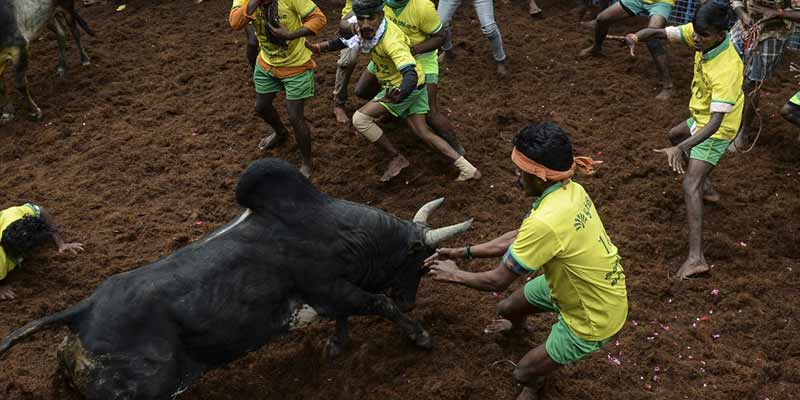- India
- May 19
SC upholds laws allowing ‘jallikattu’, ‘kambala’, bullock-cart racing in 3 states
The Supreme Court on May 18 upheld the validity of amendment Acts of Tamil Nadu, Maharashtra and Karnataka which allowed bull-taming sport ‘jallikattu’, bullock-cart races and buffalo racing sport ‘kambala’, saying they are valid legislations.
In a unanimous verdict, a five-judge constitution bench headed by Justice K.M. Joseph noted that the ‘Prevention of Cruelty to Animals (Tamil Nadu Amendment) Act, 2017’, the ‘Prevention of Cruelty to Animals (Maharashtra Amendment) Act, 2017’ and the ‘Prevention of Cruelty to Animals (Karnataka Second Amendment) Act, 2017’ were enacted by the respective state legislatures and had received presidential assent.
Jallikattu in Tamil Nadu
Jallikattu is a Tamil word, which comes from the term “callikattu”, where “calli” means coins and “kattu” means a package. Jallikattu refers to silver or gold coins tied on the bulls’ horns. People, in the earlier time, used to fight to get at the money placed around the bulls’ horns which depicted as an act of bravery. Later, it became a sport conducted for entertainment and was called “yeruthu kattu”, in which a fast moving bull was corralled with ropes around its neck. Started as a simple act of bravery, later, assumed different forms and shapes like jallikattu in the present form, bull race, etc, which is based on the concept of flight or fight. Jallikattu includes manjuvirattu, oormaadu, vadamadu, erudhu, vadam, vadi, and all such events involve taming bulls. This event essentially involves a bull which is set free in an arena and human participants are meant to grab the hump to score in the “game”. Jallikattu is conducted with a view to follow tradition and culture.
Kambala in Karnataka
The kambala race, held in Karnataka between November and March, involves a pair of buffaloes tied to a plough and anchored by one person. They are made to run in parallel muddy tracks in a competition in which the fastest team wins. Kambala is a traditional sports event normally held as a part of tradition and culture in the state.
Bullock-cart race in Maharashtra
Bullock-cart race means an event involving bulls or bullocks to conduct a race, whether tied to cart with the help of wooden yoke or not (by whatever name called), with or without a cartman with a view to follow tradition and culture. It is also known as “bailgada sharyat”, “chhakadi” and “shankarpat” in Maharashtra.
What is the case about?
• In 2011, the central government added bulls to the list of animals whose training and exhibition were prohibited.
• In May 2014, the Supreme Court in its judgment said that bulls cannot be used as performing animals, either for jallikattu events or bullock-cart races in the states of Tamil Nadu, Maharashtra or elsewhere in the country and banned their use across the country.
• These bovine sports were held to be contrary to the provisions of Sections 3, 11(1)(a) and (m) of the Prevention of Cruelty to Animals Act, 1960.
• The apex court had declared Tamil Nadu Regulation of Jallikattu Act, 2009 as constitutionally void, being violative of Article 254(1) of the Constitution.
• The legislations were enacted by the three state legislatures and received presidential assent. The presidential assent was sought for by the three states in terms of Article 254(2) of the Constitution of India.
• These amendment Acts in substance seek to legitimise various types of bovine sports including jallikattu in Tamil Nadu, bullock cart race in Maharashtra and kambala in Karnataka.
• The three laws were challenged by various organisations and individuals on the ground that it violated the 2014 judgment.
• In February 2018, the Supreme Court referred the pleas related to jallikattu to a five-judge Constitution bench to decide if the bull-taming sport fell under cultural rights or perpetuated cruelty to animals.
What the Constitution bench said?
• Accepting that jallikattu has been played in Tamil Nadu for centuries, the SC bench did not undertake the task of discovering whether the sport is part of the cultural heritage of the state and its people.
• In the bench’s opinion, the expressions jallikattu, kambala and bullock cart race as introduced by the amendment Acts of the three states have undergone substantial change in the manner they were used to be practiced or performed and the factual conditions that prevailed at the time the 2014 judgment was delivered cannot be equated with the present situation.
• The bench was satisfied that the large part of pain inflicting practices, as they prevailed in the manner these three sports were performed in the pre-amendment period have been substantially diluted by the introduction of these statutory instruments.
• The Tamil Nadu Amendment Act does not not violate the provisions of Articles 14 and 21 of the Constitution of India, it said.
• The decision on the Tamil Nadu Amendment Act would also guide the Maharashtra and the Karnataka Amendment Acts and the bench found all the three amendment Acts to be valid legislations.
Manorama Yearbook app is now available on Google Play Store and iOS App Store


